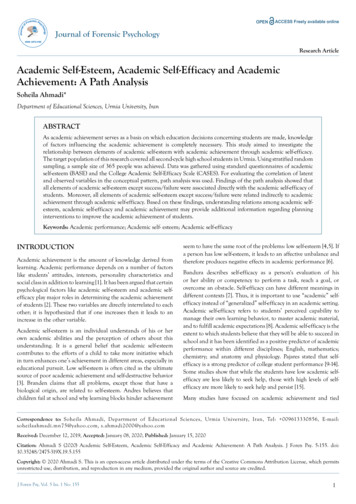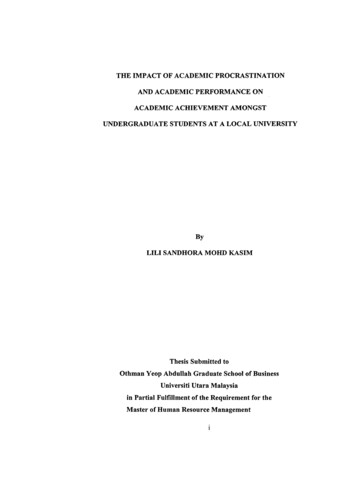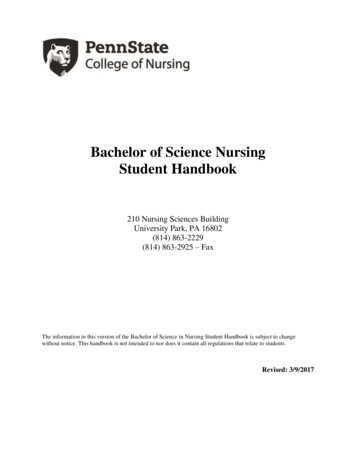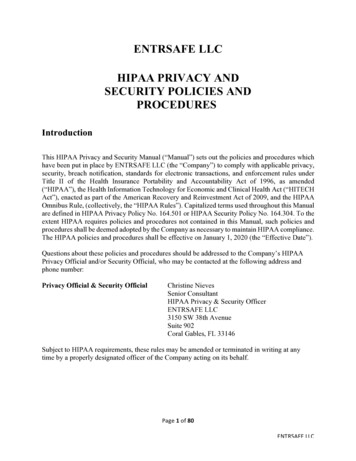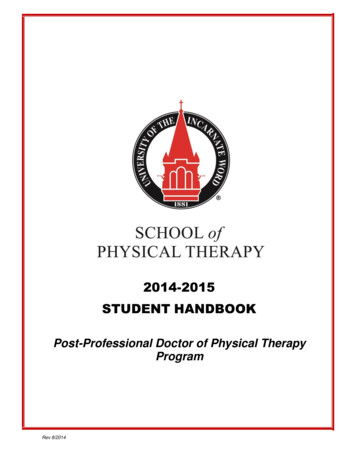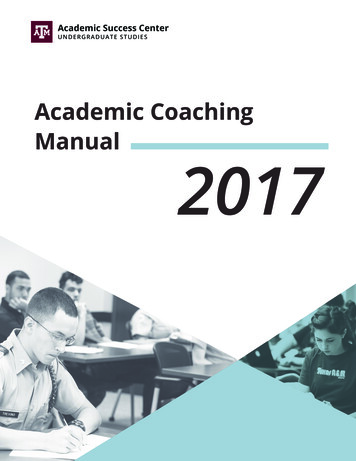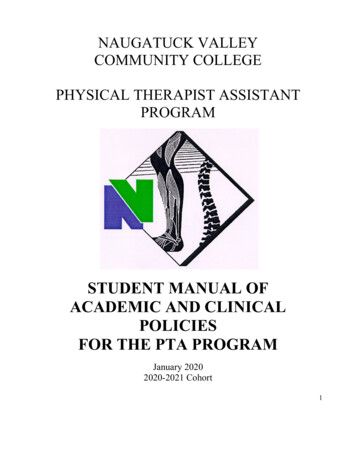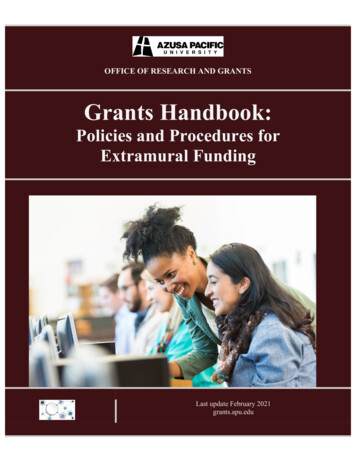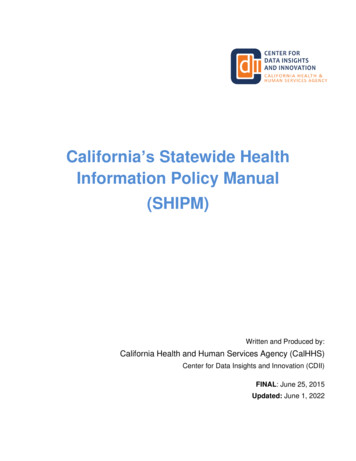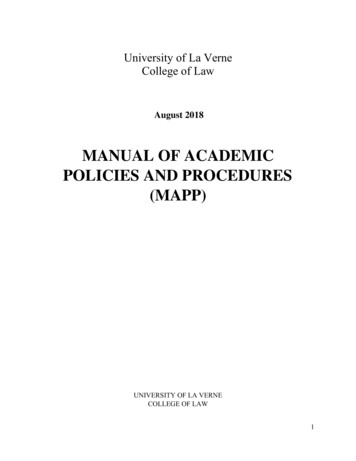
Transcription
University of La VerneCollege of LawAugust 2018MANUAL OF ACADEMICPOLICIES AND PROCEDURES(MAPP)UNIVERSITY OF LA VERNECOLLEGE OF LAW1
MANUAL OF ACADEMIC POLICIES AND PROCEDURES(May 2018)Table of ContentsI.SCHOLASTIC STANARDS4A. MAPP EFFECTIVE DATE4B. MATRICULATION REQUIREMENTS4C. GRADUATION REQUIREMENTS4D. GOOD ACADEMIC STANDING6E. ACADEMIC WARNING7F. ACADEMIC DISQUALIFICATION8G. PETITIONS FOR READMISSION8H. READMISSION ON PROBATION9I. ACADEMIC DISQUALIFICATION FOLLOWING PROBATION9J. ATTENDANCE POLICY10K. ACADEMIC HONORS10L. PETITION FOR RELIGIOUS ACCOMODATION11M. STUDENT 510 COMPLAINTS11II.12EXAMINATIONSA. COMPOSITION OF EXAMINATIONS12B. ADMINISTRATION OF EXAMINATIONS12C. EXAMINATION SCHEDULE13D. REVIEW OF EXAMINATIONS14E. STUDENTS WITH DISABILITIES15F. STUDENTS FOR WHOM ENGLISH IS A SECOND LANGUAGE15III.16GRADES AND GRADING2
A. GRADING OBJECTIVES16B. GRADING SYSTEM17C. OTHER TRANSCRIPT GRADES18D. GRADING PROCEDURES – GENERAL19E. REPEAT COURSES20F. GRADE CHANGES20G. RELEASE OF GRADES23H. GRADES OF “0.0” – “1.6”23I. CREDIT HOURS POLICY23IV.23STUDENT CODE OF CONDUCTA. JURISDICTION24B. PROHIBITED CONDUCT24C. STUDENT CONDUCT PROCESS28D. OVERVIEW OF PROCESS20APPENDIX A: UPPER DIVISION WRITING REQUIREMENT37APPENDIX B: DUAL DEGREE PROGRAMS: JD/MBA AND JD/MPA38APPENDIX C: STUDENT 510 COMPLAINT FORMUNIVERSITY OF LA VERNE COLLEGE OF LAW403
MANUAL OF ACADEMIC POLICIES AND PROCEDURESAugust 2018All updates to the MAPP shall apply to all students at the University of La Verne College of Lawfrom the date they are adopted, regardless of the student’s date of enrollment.I.SCHOLASTIC STANDARDSA. MAPP EFFECTIVE DATEAll updates to the MAPP shall apply to all students at the University of La Verne Collegeof Law from the date they are adopted, regardless of the student’s date of enrollment.B. MATRICULATION REQUIREMENTS1. For all academic credits undertaken and degree conferred prior to entering theCollege of Law, matriculating law students must provide official transcripts of thesame to the Registrar’s Office of the College of Law by October 15th following theirinitial registration for courses at the College of Law.2. In addition to the official transcripts mentioned in subsection I (B)(1) any studenttransferring from another law school must provide official transcripts for coursesundertaken at any other law school.3. Failure to comply with Section 1 or Section 2 above may result in action by theCollege of Law including involuntary withdrawal.C. GRADUATION REQUIREMENTS1. The conferral of the Juris Doctor (J.D.) degree requires that a student:a. Shall have completed a minimum of 88 units (semesters hours of credit);b. Shall have completed the required courses and any other curricular or cocurricular requirements as designated by the College of Law for the entering classto which the student belongs;c. Shall have a minimum cumulative grade point average (GPA) of 2.0;d. Shall have satisfied the Upper Division Writing Requirement described inAppendix A; and4
e. shall have satisfied all financial obligations to the University of La Verne.2. Minimum and maximum unit loadsThe normal unit load for full-time students is 12-16 units per semester (fall andspring), with a maximum of 17 units permitted only by approval of the AssociateDean for Academic Affairs. Full-time students may enroll in a maximum of 8 units inthe summer, except as described below (Study Abroad) and Appendix B (DuelDegree Programs).The normal unit load for part-time students is 8-11 units per semester, and up to 5units in the summer (except as described in Appendix B).No student may register for, or drop to, fewer than 8 units for more than twosemesters.3. Courses taken on a credit/no-credit basis, whether required or elective, are notincluded in calculating a student’s semester or cumulative GPA. Subject to theapplicable ABA standards, and this MAPP, there is no prescribed limit to the numberof credit/no-credit elective units in which a student may enroll.a. Courses in other divisions of the University of La Vernei. Students not pursuing a second degree at the University of La Verne areeligible to enroll in courses in the graduate division of the University of LaVerne only after completion of two semesters at the College of Law (full-timeor part-time).ii. Courses must bear a direct relation to the student’s legal career goals.iii. Details on Dual Degree Programs (JD/MBA and JD/MPA) can be found inAppendix B.b. Courses taken at other law schools.i. Generally, the course must be one not offered at the College of Law;ii. The student must have a cumulative GPA of 2.3 or above;iii. The student must earn a grade at least equivalent to the average required forgraduation from that institution, or a C (2.0), whichever is higher.5
iv. A student with a cumulative grade point average of 2.3 or above may petitionthe Office of the Dean for permission to complete up to 30 units ofcoursework at another ABA-approved law school and apply those unitstowards the Juris Doctor Degree. Any courses at the other law school that thestudent wants to count toward fulfillment of College of Law required coursesfor graduation must be approved in advance by the Associate Dean forAcademic Affairs.c. Study Abroad Crediti. The student must have a cumulative GPA of 2.3 or above.d. Externship Crediti. No student shall receive more than 12 units of externship credit. Students withprior permission of the Director of Experiential Learning, may receive up to 4units of externship credit in any one semester and up to 4 units of externshipcredit during the summer term. Students may not enroll in the same placementin consecutive semesters, the semester constituting a “semester” for purposesof this prohibition.4. All requirements must be satisfied within five years of enrollment at the College ofLaw, and in no event more than 84 months after commencement of law study at a lawschool from which the College of Law has accepted transfer credit.5. Until all requirements have been completed, a student shall not be allowed tograduate, a degree will not be conferred, nor will a student be certified by the Collegeof Law to any state bar or other entity as having satisfied the educationalrequirements for completing the College of Law’s program of legal education for aJuris Doctor degree.6. Any Student who takes the bar examination of any State before completing allgraduation requirements will be denied approval for the award of the degree.D. GOOD ACADEMIC STANDINGAll students are required to maintain good academic standing at all times during thecourse of their law studies.Good academic standing requires that a student maintain a cumulative GPA of 2.0 orabove, and be in compliance with all terms and conditions imposed by academic warningor probationary status.6
“Cumulative grade point average” (GPA) shall include the averaging of all semester-endgrades received in courses (weighted by units), whether or not subsequently repeated.Summer grades are included with those of the following fall semester.A determination of good standing shall be made after each semester, with the summerterm being considered part of the fall semester.Registration and/or enrollment in courses may take place during the prior semester.Neither registration, enrollment, nor class attendance constitutes waiver by the College ofLaw of academic requirements of good standing.E. ACADEMIC WARNING1. A student shall be placed on academic warning if:a. The student’s grade point average for the first semester of the first year of study(full time or part time) is below 2.5; orb. The student’s cumulative grade point average is below 2.3 but above 1.99 anysubsequent semester.2. A student on academic warning is subject to the following terms and conditions forcontinued study:a. The student shall enroll in and complete a normal load (full time or part time)during the period of academic warning unless, for good cause, this requirement iswaived by the College of Law;b. The student shall meet as directed with College of Law personnel (such as facultyadvisor or Center for Academic & Bar Readiness staff);c. The student shall not hold office in any student-run organization during the periodof academic warning and shall resign from any such office upon being placed onacademic warning;d. The student shall not represent the College of Law in any extramural competition;e. The student may not receive credit for any course taken at another law school orsummer-abroad program during the period academic warning; andf. The student shall not be eligible to participate in any law review.7
3. Failure to comply with any of the above terms and conditions will result in loss ofgood standing, and subject to the discretion of the Dean, the student will not bepermitted to continue at the College of Law.4. Strategic Legal Methods: If a student’s cumulative grade point average is 2.7 orbelow after the second semester, that student shall take and pass Strategic LegalMethods I in their third semester. If the student’s cumulative GPA is 2.7 or below atthe end of the third semester, the student shall take and pass Strategic Legal MethodsII in their fourth Semester. Strategic Legal Methods (SLM) I and II are one unit eachoffered on a credit/no credit basis and must be taken along with the other requiredsecond-year courses. Students with a cumulative GPA above 2.7 may take SLMIand/or SLM II as an elective. There are no prerequisites for either course.F. ACADEMIC DISQUALIFICATION1. After the First SemesterA student whose overall GPA after the first semester (full- or part-time) is 1.6 orbelow is academically disqualified and may not continue. However, such a studentmay apply for readmission. If readmitted, no credit will be given for any course takenin the semester which led to disqualification, regardless of grades received.2. After the Second SemesterA student whose overall GPA after the second semester is below 2.0, will beacademically disqualified and may not continue. However, such a student may applyfor readmission. If readmitted, no credit will be given for any course taken in thesemester which led to disqualification, regardless of grades received.3. After Three or More SemestersA student is academically disqualified and will receive a notice of exclusion from theCollege of Law ifa. The student’s cumulative GPA falls below 2.0; orb. The student’s semester GPA is below 2.0 AND the student’s cumulative GPA(including the most recent semester) is below 2.5.8
G. PETITIONS FOR READMISSIONAs stated in I.(F)(1) and I.(F)(2), supra, a student academically disqualified after thefirst or second semester may not continue, but may only apply for readmission to re-startthe program of legal education.A student academically disqualified after the third or subsequent semester shall have theright to petition for readmission, permitting continuation of the program of legaleducation.A petition for readmission must be filed no later than 10 calendar days following thestudent’s receipt of a notice of academic disqualification.A petition for readmission must include: the name of the petitioning student; the effectivedate of the notice of academic disqualification; the student’s complete transcript; and astatement of facts and reasons which the student believes should allow him or her tocontinue the course of study at the College of Law.Petitions for readmission will be considered and decided by the faculty of the College ofLaw, or by delegation to the Academic Standards Committee, based on writtensubmissions only, in a timely fashion, but no less often than twice per year.If a student filing a petition for readmission is also challenging one or more examinationsor grades (see III.F, infra), the grade challenge must be included in the petition forreadmission; the challenges to the examinations or grades be resolved first.H. READMISSION ON PROBATIONIn granting a petition for readmission, the faculty may impose any terms of probation thatit judges to be academically warranted.In addition, students who are readmitted on probation are subject to the terms andconditions associated with academic warning status, I(E) supra.A student on probation is not eligible to participate in a dual degree program. (For detailson dual degree programs, see Appendix B.)9
The conditions of probation remain in force until:1. Two semesters have elapsed (with the summer term considered a part of thefollowing Fall Semester); and2. The student’s cumulative GPA is 2.5 or above after the first semester ofprobation; or3. The student has completed all degree requirements with a cumulative GPA of 2.0or above.The faculty may, in its sound discretion, waive non-academic terms and conditions ofprobation as these would otherwise apply to a graduating senior.I. ACADEMIC DISQUALIFICATION FOLLOWING PROBATIONAny student on probation, including any student originally admitted on probation, will beacademically disqualified without eligibility for readmission if:1. The student’s semester GPA falls below 2.0 for any semester included within theperiod of probation; or2. The student’s cumulative GPA is below 2.0 at the end of the period of probation; or3. The student fails to meet any condition of probation imposed at the time of(re)admission.J. ATTENDANCE POLICY1. There are no excused absences.2. Tardiness, leaving early, and/or lack of preparedness may, in the instructor’sdiscretion, constitute an absence or partial absence.3. Students in circumstances which they anticipate may lead to excessive absences areencouraged to officially withdraw from their classes and/or reduce their unit load,rather than waiting to be automatically withdrawn.4. Absences in excess of 20% of regularly-scheduled class meetings result in automaticwithdrawal from the course, ineligibility to take the final exam, and a grade of F/0.0unless, upon petition by the student, the Dean determines that the student shouldreceive an IWF (Involuntary Withdrawal Fail).10
K. ACADEMIC HONORS1. The Dean’s List is compiled after the fall and spring semesters and includes allstudents who have a current semester GPA of 3.0 in law school courses.2. CALI (Computer-Assisted Legal Instruction) Awards are given to the student(s)receiving the highest grade in a class.A student who is repeating a class is not eligible for the CALI Award in the repeatedclass.3. The students in the top 15% of the graduating class receive honors at graduation,designated as summa cum laude, magna cum laude, and cum laude, as determined bythe faculty. The “graduating class” includes all students who complete theirgraduation requirements during the academic year immediately preceding thecommencement ceremony. Until all spring semester grades are received (aftercommencement), final cumulative GPAs and class rankings shall not be calculated.Honors at graduation (including honors appearing in the commencement materials)are therefore provisional and subject to change.4. The student with the highest cumulative GPA in the graduating class as of theconclusion of the fall semester immediately preceding commencement shall bedesignated as Class Speaker and shall be invited to deliver the class address.5. For purposes of determining honors at graduation, valedictorian, and Class Speaker,no grade earned at another law school will be included in the student’s GPA. Inaddition, transfer credits and joint degree units earned in a another division of theUniversity of La Verne other than the College of Law, or other graduate institutionwill be excluded from GPA calculations.6. In order to be considered for valedictorian, or class Speaker a student must earn atleast 44 units at the College of Law.L. PETITION FOR RELIGIOUS ACCOMMODATIONAll requests for academic religious accommodations shall be addressed to the AssociateDean of Academic Affairs, or the Associate Dean’s designee, within two weeks of thestart of academic term or publication of the relevant date(s).11
M.STUDENT 510 COMPLAINTS1. Submitting a Complaint: 510 complaints must be submitted in writing to the AssociateDean of Academic Affairs using the Student Complaint form, contained in AppendixC. Concerns which implicate the ABA Standards will, be communicated asappropriate to the ABA. The complaint must meet the following requirements:a. Explain in detail the behavior, program, process, or other matter that is at issue,and describe how the matter directly implicates the law school’s program of legaleducation. If the complaining student believes that the matter implicatescompliance with a specific ABA standard, then the student must identify thespecific ABA standard implicated. The ABA standard is available at: [URL].b. Contain the student’s name, law school email address, and current mailingaddress.2. Addressing a Complaint: Within a reasonable time [SIC] days after a complaint froma student is received the Associate Dean of Academic Affairs, or the AssociateDean’s designee, will advise the student in writing of any action the College of Lawis taking to address the matter. If further investigation is needed, the student will beprovided with a response to the complaint within a reasonable time [SIC] businessdays after completion of the investigation.3. Investigation of Complaints: The Associate Dean of Academic Affairs, or theAssociate Dean’s designee, may conduct an investigation into any complaint filed.All University community members are required to cooperate with the investigation.a. Obligation to Provide Truthful Information: All University community membersare required to provide truthful information in any report or proceeding under thispolicy or any other subsection of the MAPP. Submitting or providing false ormisleading information in bad faith or with a view to personal gain or intentionalharm to another in connection with an incident of Prohibited Conduct isprohibited and subject to disciplinary sanctions under the Code of StudentConduct. This provision does not apply to reports made or information providedin good faith, even if the facts alleged in the report are not later substantiated.4. Appealing a Decision on a Complaint: A student may appeal a decision on acomplaint within 10 business days from the date of the response by the AssociateDean of Academic Affairs, or the Associate Dean’s designee. Any appeal will bebrought before the Dean of the Collage of Law. The Dean’s decision is final.12
5. Records of Student Complaints: The Associate Dean for Academic Affairs will keepa record of all complaints and resolutions for eight years from the date of the finalresolution of the compliant.II.EXAMINATIONSA. COMPOSITION OF EXAMINATIONS1. Each faculty member shall be responsible for the preparation, content, and grading ofthe examinations and exam answers in the courses such faculty member teaches.Professors may collaborate on examination content. Examinations shall beappropriately rigorous and shall reflect the content taught over the course of thesemester.Take-home examinations shall be permitted in upper division courses with thepermission of the Associate Dean for Academic Affairs. Such examinations shall beprohibited unless approved in advance.2. The time allowance for a final examination should be one hour for each unit of creditfor which the course is offered. No exam should exceed three hours without priorpermission of the Associate Dean for Academic Affairs.3. Skills-based and seminar courses are not required to have a written final examination;and the course grade may be based on alternative assessment criteria, including, butnot limited to: class participation, written projects, oral arguments, and/orcollaborative team-work.B. ADMINISTRATION OF EXAMINATIONS1. GradingStudents’ grades in all courses shall be based upon examination grade(s) or by theterms provided in the syllabus.If the grading of the course is based on assignments in combination with a final exam,the professor may not allocate more than 10% of the final grade to class participation.The professor may base up to 30% of the final grade on midterm exams, assignments,exercises, or other activities which require substantive, analytical skills. In bar-testedsubjects, the final examination must be worth at least 60% of the overall grade.2. The course syllabus must be available to students on the first day of the course andshall advise the class of the grading and weighting of course components.13
3. Timing of ExaminationsThe examination for each subject taught by a faculty member shall be given at thesame time to all students who took the course from that faculty member. Thescheduling of examinations shall be the responsibility of the Associate Dean forAcademic Affairs and the Registrar. They shall provide security for all examinationquestions and have the exams reproduced and furnished to faculty members orproctors for distribution to students. Instructors are required to be on campus duringthe administration of their exams unless exceptional circumstances exist and theinstructor has the permission of the Associate Dean for Academic Affairs. Instructorsnot on campus must be available via telephone for the entire time during whichstudents are taking the examination.4. Anonymous GradingGraded or for-credit examinations and papers submitted in lieu of writtenexaminations, except for Seminars, shall be identified and graded through the use of astudent identification number on the examination or paper. Anonymous grading shallnot apply to individual assignments or assessments worth 10% or less of the student’soverall course grade.It is the responsibility of the student to make sure his or her personal identity does notappear anywhere on the examination documents or on written assignments. Eachstudent must use the exam number assigned to him or her by the Registrar.5. Approved Examination MaterialsThe Director of Information Technology shall release technology guidelines forstudents prior to orientation. Examination rules shall be released no later than thesecond week of the semester. In addition, the Office of the Registrar shall provide alist of items allowed into examination rooms in advance of the start of finalexaminations, including items approved for use by the professor.Students are responsible for familiarizing themselves with and adhering to theirprofessor’s policies regarding approved information, materials or devices which arepermitted during an exam.C. EXAMINATION SCHEDULE1. Examinations will be taken at the time and place scheduled, except as providedbelow.2. Rescheduling Examinations14
Students requesting the rescheduling of an examination shall file a petition requestinga new date and time within two weeks of the posting of the final exam schedule.Students must provide documentation supporting their request. Students requesting anew exam date may not communicate directly with their instructors in order topreserve anonymity and the integrity of grading.Students who have two final exams scheduled less than 24 hours apart, final examsscheduled on three consecutive calendar days, or final exams scheduled on the sameday as their regularly-scheduled religious observance, may contact the Registrarfollowing the guideline above.3. Emergency Rescheduling of ExaminationsIf an emergency beyond the student’s control prevents the timely filing of arescheduling request, the student shall contact the Dean, the Associate Dean forAcademic Affairs or the Registrar to request a new date and time for the examination.The student must provide documentation supporting the request. If the evidence doesnot justify rescheduling the examination, the student must take the exam at the regulardate and time.4. Missed ExaminationsStudents who miss an examination may file a request to take a rescheduledexamination; the request must be filed within 48 hours of missing the examination.Students must provide documentation supporting their request, showing thatextraordinary circumstances prevented them from attending the examination.D. REVIEW OF EXAMINATIONSFollowing the release of grades, students may inspect their essay examination answersand upon request copies will be made.Examination answers remain the property of the College of Law and are subject toCollege of Law document retention and destruction policies. Any student challenging thegrading of an exam must first address such questions to the professor responsible forgrading the examination; the student must contact the professor within 30 days of therelease of grades. Thereafter, the student may file an appeal to the Associate Dean ofAcademic Affairs within seven days of meeting with the professor who graded theexamination. If the professor does not respond to the student within seven days, thestudent may file an appeal directly to the Associate Dean of Academic Affairs; suchappeals must be filed within 30 days of the release of grades.15
Any student challenging examination content or the administration of the exam must filea formal protest with the Director of Student Experiences within seven days of taking theexam.E. STUDENTS WITH DISABILITIES1. Students with disabilities should refer to the policies described in the University of LaVerne Disabled Student Services Handbook [as of September 13, 2017 located ces/disabled-studentserviceshandbook/], which can be found on the website of the University of La VerneDisabled Student Services website /disabled-student-services-handbook/) or at their office. Temporaryaccommodations are offered on a case by case basis. All required documentationmust be submitted by the student before any formal accommodations can be granted.and should be made directly to the Director of Student Affairs.2. Any student eligible for and requesting academic accommodations due to adocumented disability (or a suspected disability) must contact the College of LawDirector of Student Affairs and Americans with Disability Act Compliance Officer,or the University of La Verne Disabled Student Services office; both listed below. Inorder to be considered for accommodations, disabilities must be documented and theproper medical evaluations must be submitted. Theoffice is here to help you succeed in law school. Visit it online ces/.a. College of LawStudent Affairs and American with Disability Officer[NAME OF COMPLIANCE OFFICER][ELECTRONIC MAIL ADDRESS OF COMPLIANCE OFFICER][TELEPHONE NUMBER OF COMPLIANCE OFFICER].[OFFICE NUMBER OF COMPLIANCE OFFICER]b. University of La VerneDisabled Student Services[NAME OF REPRESENTATIVE AT UNIVERSITY OF LA VERNEDISABLED STUDENT SERVICES][EMAIL ADDRESS OF REPRESENTATIVE][TELEPHONE NUMBER OF REPRESENTATIVE][OFFICE ADDRESS FOR DISABLED STUDENT SERVICES OFFICE].3. It shall be the duty of the Dean, or Dean’s designee, of the Law School to updateinformation in subsection (2)(a)(b) as changes occur.16
F. STUDENTS FOR WHOM ENGLISH IS A SECOND LANGUAGE1. Students for whom English is a second language may qualify to receive extra timeduring written examinations which are administered under timed conditions.Accommodations for English as a second language will not be provided for any otherassignments.2. Any student seeking extra time must submit a written request to the Registrar as earlyas possible but no later than five working days before the examination. Such studentsshould submit their request in writing with supporting documentation. The Registrarmay grant the accommodations under the following circumstances:a. The student native language is not Englishb. The student's degree (undergraduate degree if JD student, law degree if LL.M.student) was completed at an institution where the language of instruction was notEnglish.c. The student has lived in the United States or another English-speaking country forno more than five years at the time of matriculation.d. The student did not obtain a waiver of the TOEFL based on English proficiency.Accommodations are limited to additional time as outlined below and/or the use ofnon-legal translation dictionary.Students who qualify to receive extra time during written examinations shall receiveup to 50 percent more time for each examination during the first two semesters ofstudy and up to 25 percent more time for each such examination during the third andfourth semesters of study. No extra time will be permitted during the fifth and sixthsemesters.III.GRADES AND GRADINGA. GRADING OBJECTIVESThe grading policies and procedures are designed to achieve a fair, even-handed, andrealistic evaluation of academic performance for each student as he/she proceeds throughthe course of study.17
B. GRADING SYSTEM1. All students will receive grades upon completion of each course, which will be basedupon the following system of numeric grades:OutstandingExcellentVery GoodGoodFairly GoodAdequateMinimally AdequateInadequatePoor, With No CreditVery Poor, With No CreditExtremely Poor, With No CreditFailing, With No .0–0.62. When approved in advance by the Dean or Associate Dean for Academic Affairs,certain advanced courses, as identified in the College of Law Catalog, may be offeredon a “Credit/No Credit” basis. Such grading basis shall be announced to students nolater than the first week of class. A "No Credit" grade shall not be considered incomputing numerical grade point averages.3. The following grade distribution requirements shall be applied to Contracts/DVS,Civil Procedure/DVS, Property/DVS, Constitutional Law/DVS, Torts, and CriminalLaw, where the enrollment is 21 students or more. (Where more than one section ofthe same course is taught by the same professor and the same final examination isadministered to all sections, total enrollment shall be used to achieve these gradedistribution requirements.) The grade distribution does not app
University of La Verne College of Law August 2018 MANUAL OF ACADEMIC POLICIES AND PROCEDURES (MAPP) UNIVERSITY OF LA VERNE COLLEGE OF LAW . 2 . transferring from another law school must provide official transcripts for courses undertaken at any other law school. 3. Failure to comply with Section 1 or Section 2 above may result in action by the
